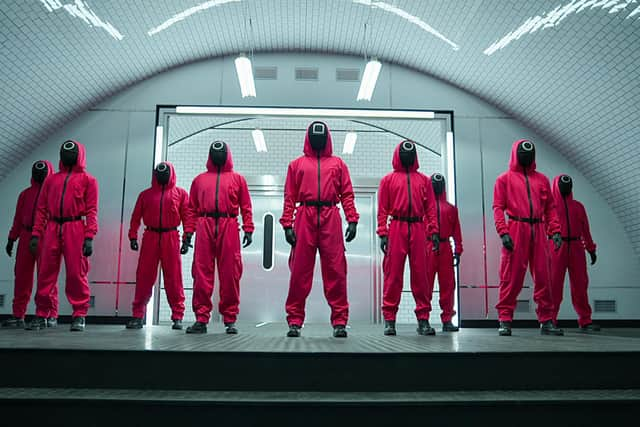Squid Game The Challenge: Scottish competitor tells of his time on anticipated Netflix reality show he dubs a 'big, messed up human experiment'
It is a hit South Korean drama series that tells the story of a secret contest where 456 players risk their lives to play a series of deadly games in a bid to win a ₩45.6 billion (£28 million) prize.
Now, a Scottish competitor has told of his own Squid Game experience, when he took part in a Netflix spin-off show that saw 456 real players shut in together to battle it out for $4.56m (£3.66m) – one of the biggest prize funds ever to be offered on television.
Advertisement
Hide AdAdvertisement
Hide AdBeetle Campbell, labelled number 439 on the show, says Squid Game: The Challenge felt “real” during the nine days he was shut in a windowless dormitory with hundreds of other contestants. The contestants were given just a toothbrush, hairbrush and standard-issue clothes during the competition. They had no access to the outside world and were fed just 800 calories a day.


"It was complete over-stimulation when I got out back into the real world, because they just they just made it feel so real,” he said. “It's a reality TV show, sure. But when you're locked in a room and talking to you over a tannoy and the guards come out and they've got their masks on and they're feeding you 800 calories a day so all the guys are doing getting angry, it feels very real.”
He said days could go by where no “game” took place, leaving competitors on edge that a game could be announced any minute. One day, he recalls guards speaking to them through a tannoy during the night.
“They're trying to stir the pot and make you feel as uneasy as possible,” he said. “And they did a good job of that."
Mr Campbell, 27, from Loch Lomond, was scouted for the show by Netflix via his Instagram page.


"I ticked the Scottish box and they liked all my outdoorsy stuff,” said Mr Campbell, who is an expedition and adventure filmmaker. He has previously told how he had been trapped on a Nepalese mountain with a group of men with spinal cord injuries during a film project.
In January, he travelled to London for filming, alongside 100 other British competitors, 300 Americans and 56 people from other countries, including Australia and New Zealand.
The original series, made in South Korea and named after a popular children’s game there, told the story of the relationships between the players, all of whom have serious financial problems. It pits the contestants against each other in a bid to see how they will react to others. Unlike the new reality show, when eliminated players wear a vest that explodes black dye when it is their time to leave, the original series sees competitors shot when they lose a game.
Advertisement
Hide AdAdvertisement
Hide AdIn just a couple of hours after the show was released to Netflix at 8am on Wednesday morning, Mr Campbell – who was eliminated in the second game – was already receiving calls and messages from friends who had spotted him on it. Due to a non-disclosure agreement (NDA), he had not been allowed to tell anyone, bar his closet family and friends, that he had taken part.
"Squid Games is the biggest Netflix show ever – and this is the biggest reality TV show and prize money ever, so the scale of it was huge,” he said. “It will be the biggest show on Netflix for at least the next couple months until something else comes out. There's a lot of hype around it.”
Once a competitor is eliminated, they are given a debrief by producers, before being taken to a hotel, where they are offered psychological counselling.
"They have teams of psychologists to talk to you because it's one, kind of big, messed up human experiment, locking you in a room and telling you to mentally manipulate other people and beat them in a certain way through mind games or through physical games,” Mr Campbell said.
"There was a slight element of PTSD afterwards. I'm not the only one that shares that feeling. When you’re used to performing well and you expect yourself to do better than you did, then, of course it's gutting.”
He added: “The opportunity to win $4m was huge. Psychologically, I wouldn't want to put myself in that position again. But the opportunity of that, then the exposure that comes with that, is going to change your life. So in that instance, I would do it. But with regards would I openly put myself in a situation like that, again, knowing what it was like? I'd question it.”
Comments
Want to join the conversation? Please or to comment on this article.
